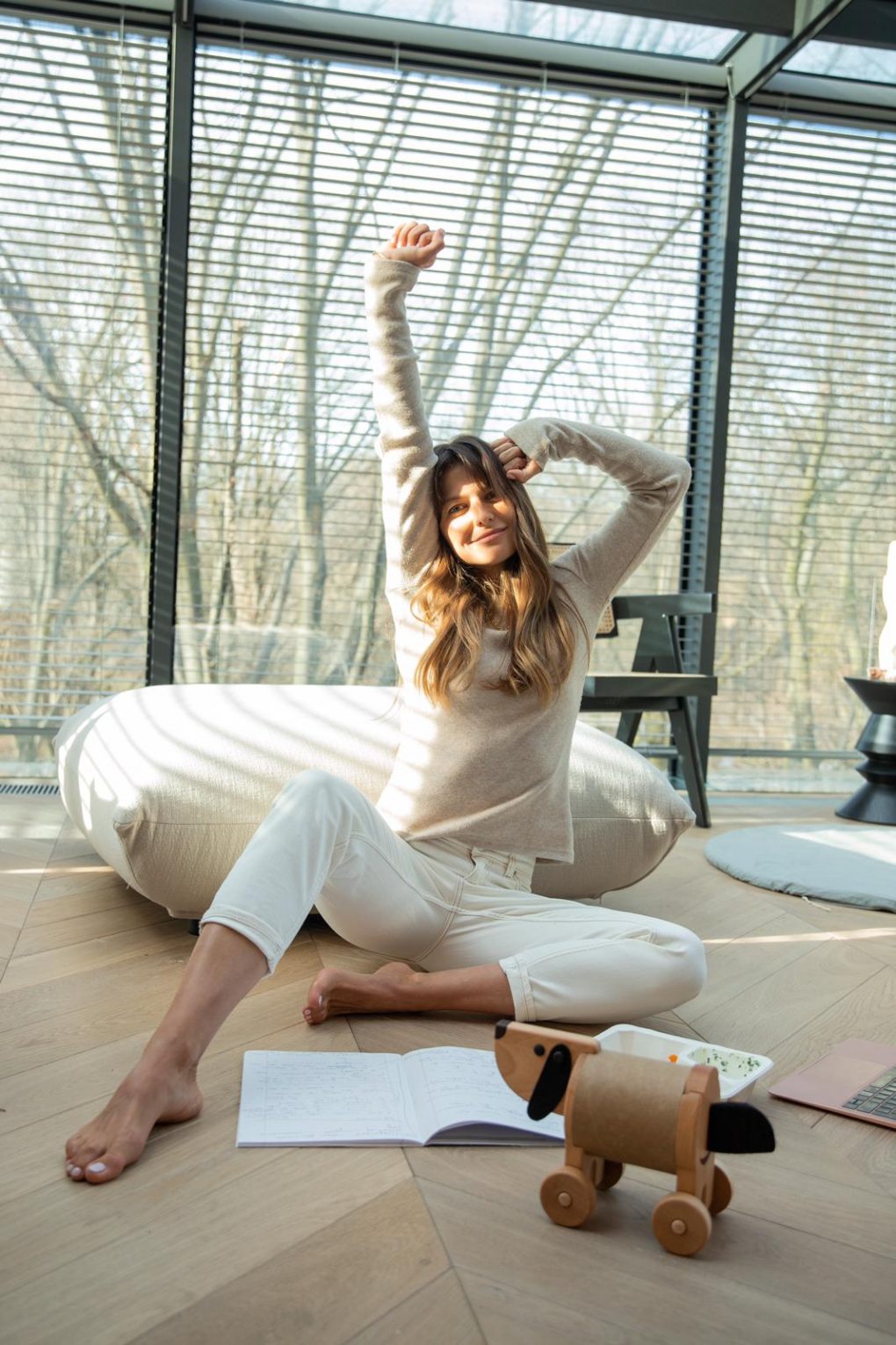
Stress – how to deal with it? My tried and true solutions
Stress is a phenomenon that accompanies all of us. Innumerable articles on how to deal with it have been published. Today I will show you what methods I use. Although stress is sometimes helpful (e.g. it protects us from danger), nobody likes it. Especially when it accompanies us at every moment because then it turns into a negative phenomenon which can have serious health consequences. Today, most of us struggle with a lot of exposure to negative emotions, combined with an excess of responsibilities, difficult choices, hate speech, hatred or the everyday rush for … well – for what exactly? Being both a public figure and an entrepreneur, I am constantly judged. Finding a way to deal with stress was a crucial step for me. Currently, I use various workshop techniques that I am happy to share with my loved ones and now also with you ?
How to reduce stress?
Stress can’t be avoided and we don’t have the power or ways to control it completely. However, how we deal with the tension and how we face the challenge that leads to stress is definitely up to us. I have described a few examples from my own experience that show how to relieve stress easily.
1. Moderate physical activity
I believe that it is one of the best ways to relieve stress. If you have negative feelings, choose strong training that will leave bad emotions on the mat. When you need relaxation and calmness, I recommend yoga or longer stretching. Remember to breathe properly so that your body can feel fully relaxed. Working out with my app (you will find it HERE) allows you to choose the level of difficulty of exercises, tailored to your individual level of training. In the application you will find a variety of programs: from cardio training, strength training (e.g. with a barbell), to yoga.
2. Breathing exercises
Diaphragm breathing is a known and extremely effective way to relieve tension. I used it a lot when I practiced karate. The exercises that I recommend take only 35-40 seconds and you can do them almost anywhere! The instructions are as follows:
- Stand or sit up straight and try to distract yourself from the stressful situation and what is happening around you. Take a deep breath through your nose counting to three. Hold your breath for about 3 seconds. Then exhale deeply through your mouth, counting to three again. Repeat all steps three times.
- Take 7 slow deep breaths through your nose and 7 slow breaths out through your mouth. Repeat seven times.
Remember about the Balance function in the app which helps you work on your breathing and will guide you step by step through breathing exercises aimed at increasing your focus, regaining peace or inner harmony. You can read more about the role of breath in previous blog posts by experts in this field: HERE and HERE.
3. Isometric exercises
It is a type of strength training that involves alternating tension and relaxation of muscles in different parts of the body. These types of exercises can be performed virtually anywhere: at home, resting on the couch, at your desk at work or on the beach. Try the following exercise:
- Stand in the chair position leaning against the wall. Press a soft ball between your knees (e.g. a gym ball) with pauses to let your muscles relax.
4. Functional training
This is one of my favorites, involving many muscle groups. Its task is to use 7 movement patterns, including squat, lunge or front support (so-called planks). I urge advanced people to use some additional load during exercise. If you want to reduce tension, reduce stress and forget about problems – only 4 minutes of this type of activity are enough! Of course, you must adjust the training to your individual abilities.
5. Relaxation training
I practice it a lot in my camps. This is the moment of greatest concentration on the body, mind and breath. The effects of such training are amazing. It all happens thanks to turning off thinking about your surroundings, focusing on your breath and individual muscle groups while lying down. You can try this yourself at home!
- Close your eyes and try to think about every part of your body, starting with the head (scalp, facial muscles, eyes, palate, throat) and then working on to the trunk, abdomen, back, legs and feet. Concentrate on gradually “turning off” and relaxing the body. Once you are sure your muscles are not tense, focus on taking a deep breath. Inhale through your nose and into your stomach, slowly exhaling through your mouth. After a few minutes, open your eyes and gradually focus your attention on the outside world. This exercise can be repeated many times, depending on the need and the severity of stressful situations.
6. Rest, music, meditation/prayer
It may seem like a simple activity, yet its lack is one of the most common reasons for giving in to stress. Remember about regular breaks at work as they not only allow you to breathe again, but also increase later efficiency, which is an additional benefit. Sometimes a simple short walk brings a lot of positive changes (more about it HERE) so make sure you find some time for active rest!
I also recommend learning about the benefits of massage and acupuncture, which bring relief to our senses. This is due to 4 million receptors in our skin! The most sensitive parts of the body are the mouth, neck, fingertips and soles of the feet. Massage reduces the level of cortisol, which makes it a very effective stress reducer.
It also increases the concentration of three neurotransmitters, such as: serotonin, dopamine and oxytocin. In turn, acupuncture is a practice that has been known in Chinese medicine for millennia. It helps to naturally lower the level of stress and alleviate many different psychogenic ailments, such as joint pain, headache, problems with fertility, sleep or circulation. Thanks to my midwife, I used acupuncture at the end of my pregnancy. This is an experience that I will definitely come back to in a separate post.
I believe that meditation or prayer allows for maximum relaxation and concentration. Let us make sure that it takes place in appropriate conditions (peace, silence) with relaxing music. And here I would also like to mention music therapy which is used in the treatment of various diseases. A properly selected melody relaxes, reduces tension and brings relief. Find a moment during your busy day and listen to your favorite music. It’s a good idea to combine this activity with breathing exercises.
7. Sleep
Recently, I have been paying particular attention to the fact that my sleep should not only last long enough, but also be of good quality which can be improved with some simple solutions. I have described my methods HERE. For example, I make sure that my evenings are calm and there’s right room temperature. I also limit the exposure to blue light from electronic equipment a few hours before going to sleep. Sebastian Kilichowski’s extensive article on the connection between light and sleep quality can be found on my blog HERE. If, however, you have doubts about how much sleep you need during the day and whether it is worth taking naps, you will find more information on the topic HERE.
8. Relationships
We should try to have good, healthy relationships with others, talk to positive people and stay in their company. First, let’s pay attention to our home, i.e. the base to which we return and spend most of our time. Do whatever it takes to come back home with pleasure. In the next step, let’s deal with the workplace. Avoid conflicts, strive for agreement and ease disputes. I know it is not easy, but well-being in the workplace is a priority. In case of problems, don’t be afraid to talk. Conversation itself can bring relief. Kind, sincere, free conversations, preferably combined with cuddling, are the most important for reducing stress. Interestingly, it has been proven that physical proximity (holding hands, hugging) effectively reduces anxiety by reducing cortisol levels.
9. Healthy Eating
It’s no secret that a proper diet affects our mood and is crucial for stress reduction. Make sure your plate is full of color and variety. Have adequate magnesium intake as its levels may decline in chronic stress and prolonged nervous tension. Magnesium is abundant in nuts, pumpkin seeds, cocoa and whole grains.
10. Distance, self-development and tranquility
Can you find a moment to listen to yourself and your needs? Try to take some time to delve into your own thoughts. This is especially important to me. My schedule is full every day so sometimes I have to find a moment to stop and ask myself what I need. I care about constant self-development as it is my driving force, gives me satisfaction and allows me to keep moving forward. Being fair to yourself is another rule that I try to follow. Remember that a clear conscience is the best pillow for sleeping and sleep is a cure for fatigue and stress.
Stress cannot be completely eliminated. It will always be with us. It motivates us but unfortunately it can also cause a lot of damage, so it is worth fighting with it and knowing what weapon to use. I hope that you will my advice useful and it will help you take care of your inner balance ?









Comments No Comments
Join the discussion…